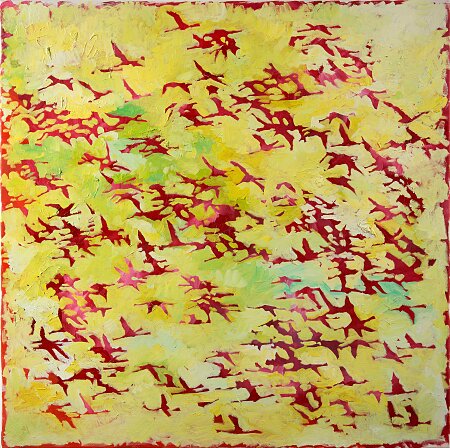
They Went Around My End
A soldier in the showers called to my uncle, “Well, Jew Boy, you’re working hard, aren’t you?”
This wasn’t the first time the man had harassed my uncle before their unit shipped out to fight the Nazis. The guy despised Pfc Richard Goldstein and his “sheeny nose,” so he baited him, trying to make my uncle use his fists, for, if he did, the Army could bar my Uncle Dick from an honorable discharge.
I was thirteen when my mother told me this story. We sat on one of the creamy white sofas in our living room. It was getting late. I was in my pajamas, and my mother wore her white terry-cloth bathrobe.
My uncle regarded the soldier. “What’s the matter?” he said in his pleasant tenor; he’d sung in operas. “Something upsetting you?”
Confident the man wouldn’t throw a punch, Uncle Dick took time toweling off his rotund body. A body that, thanks to genetics and calories, my adolescent frame was turning into. But, unlike my uncle, who had played football for Ohio State, I couldn’t throw or catch. Nor could I sing.
My mother told me what happened for a reason. “If you meet an anti-Semite, handle it the way your Uncle Dick did. You work harder. Show him you’re better than he is.”
My uncle did both, and on April 30, 1945, his unit liberated the Flossenburg concentration camp. As my mother spoke, I imagined Uncle Dick and his Army buddies celebrating their victory by raising the American flag over that vile place.
*
In 1964, when I was seventeen, I coedited the Highlights, Beverly Hills High School’s weekly newspaper. Tom ran the sports page. He had rugged, angular features and a boyish personality that, layered on top of his wit and passion for football-baseball-basketball, made him an ideal sports editor. In mid-November, he wrote that our football team’s “disunity” had caused a “bad year”; they’d lost everything except for two solid wins: 18-0 and 34-6.
“Tom, this is great,” I said after reading his next line. The team, he wrote, had “played like it was Halloween.” Not a simile calculated to endear us to the players or the coaches, but I didn’t care. I stank at football. I initialed his copy—the way editors-in-chief signaled approval—then leaned back in my chair. We’d publish the next day, Friday, the day of the season’s final match, against our chief rival, Culver City.
Among the school’s customs, upperclassmen could volunteer to mentor freshmen, known affectionately as little brothers and sisters. Mine called that Thursday evening. Diminutive with baby fat, a tender personality, and a voice that had yet to lose its falsetto, Ted was the opposite of a football letterman. He telephoned often, but I didn’t mind. He was bright enough to have skipped a grade, and he asked interesting questions. Two months earlier, he’d sent me an engraved invitation to his bar mitzvah, to be held in the Garden Room of the Bel Air Hotel. As he read from the Torah, he reminded me of a cherub. During the call, he said he’d paged through our student manual, The Norman Guide, in search of school traditions and alighted on a passage about “the victory flag.” He read it to me: “Celebrating athletic triumphs, the victory flag is raised with the American flag each morning after a Norman conquest.”
“Have you ever seen this flag?” he asked.
I never had. I didn’t know what the flag looked like. Until our phone call, I’d forgotten its mention in The Norman Guide.
“Maybe we can win tomorrow night, and we’ll see the flag on Monday,” Ted said.
Ah, youth. I didn’t want to cut into Ted’s buoyancy with my senior cynicism. His innocence would vanish soon enough. The Culver City Centaurs held third place in the league. I doubted we’d see a victory flag on Monday.
“Could happen” was all I said as I riffed a few pages of the textbook on my desk, Physics: An Exact Science.
Watching the rout didn’t appeal to me, but my sports editor had a cold, so I agreed to go. Since this would be an away game, I asked Ted if he was taking the rooter bus to Culver City, but he had other plans.
*
The excitement was palpable, something rare that season. Like almost everyone else in the visitors’ stands, I found myself surrounded by cheers. For three quarters, Culver City couldn’t manage a touchdown; we were tied 0-0, phenomenal in light of our relative standings. Then, with two minutes and fifty-nine seconds to go, Culver scored twice.
*
Half a century on, it’s hard to reconstruct a brawl. I thought everyone lost their tempers because, until the end, no one could score. But I was wrong. My seat in the bleachers was too far away to hear the Culver boys calling our players “kikes” and “dirty Jews.” But, crouched eleven inches from them on the line of scrimmage, our linemen heard the slurs. So, I’m sure, did the referees, none of whom threw a flag for unsportsmanlike conduct. The refs had flags, didn’t they? Or were theirs as evanescent as Beverly’s victory flag?
